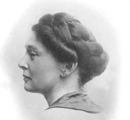English, Department of

University of Nebraska Studies in Language, Literature, and Criticism
Date of this Version
January 1920
Abstract
The history of a people can be read truly only in the light of its ideals. To study only the recorded acts of men is to see only a series of phenomena that are often incomprehensible and apparently erratic. What a mad affair the Crusades must seem to one who knows nothing of mediaeval religious ideals! How inexplicable would appear the courageous resistance of Belgium to a student in a later age who should have no knowledge of contemporary thought, and should be unable to see the principles for which she stood! Any judgment of a human action which leaves out of account the ideas which prompted it must be vain: it is only by means of a sympathetic comprehension of men's ideals that we may justly estimate their achievements and their failures. We cannot know the reality of history so long as we are content with an outward view.
Racial ideals may be bodied forth in many ways. Indeed, if they are truly ideals, they must be reflected in every phase of racial life. Greek ideals are expressed as much in the Parthenon as in the works of Aristotle or the battle of Marathon, and are equally contrasted with mediaeval ideals as expressed in a Gothic cathedral, the theology of Thomas Aquinas, or the First Crusade. But more concretely than anywhere else they are embodied in the heroes of racial myth and legend, those creatures of the popular fancy, molded in the image, not of men as they are, but of men as they would be.


Comments
UNIVERSITY OF NEBRASKA STUDIES IN LANGUAGE, LITERATURE, AND CRITICISM NUMBER 3, Lincoln, Nebraska, 1920